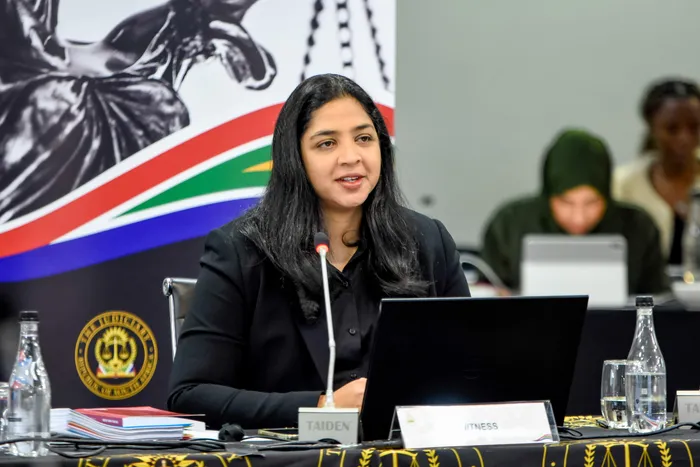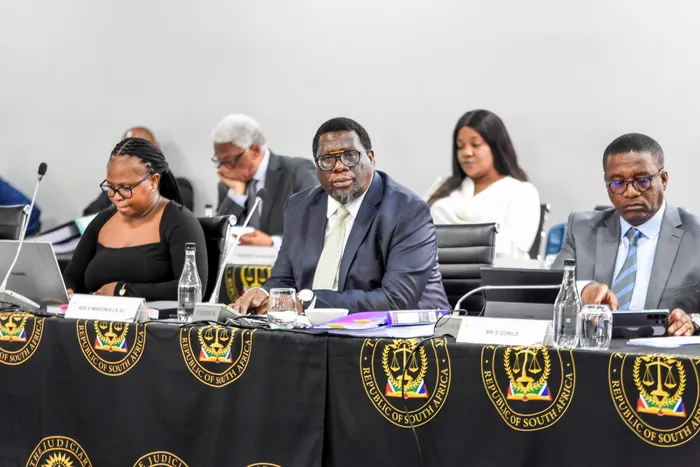Emoji interpretations in the Mengo vs Mbenenge case: A forensic linguist's perspective

Forensic and legal linguist and researcher Dr Zakeera Docrat took the stand at the Judicial Conduct Tribunal hearing into sexual harassment complaints against Judge President Selby Mbenenge.
Image: X
Emoji interpretations and sexual connotations in message exchanges came under the spotlight as forensic and legal linguist and researcher Dr Zakeera Docrat took the stand at the Judicial Conduct Tribunal hearing into sexual harassment complaints against Judge President Selby Mbenenge.
Docrat on Tuesday testified on conversations between complainant Andiswa Mengo and Mbenenge, which she described as starting courteously and professionally but “slowly degenerated” as emojis used in the message exchanges became sexual and flirtatious.
Docrat prefaced her evidence concerning knowledge of interpreting emojis after Griffits Madonsela SC, counsel for Mbenenge, said they did not dispute her qualifications and expertise; however, they disputed “her expertise in emojis”.

Forensic and legal linguist and researcher, Dr Zakeera Docrat, took the stand at the Judicial Conduct Tribunal hearing into sexual harassment complaints against Judge President Selby Mbenenge.
Image: Supplied / Judicial Conduct Tribunal
Docrat submitted that she had, since 2018, researched how emojis are used and related this to the South African context, which is multicultural and multilingual.
She further added that her expertise stretched to forensic and legal linguistics and the symbiotics of law linguistics.
With regard to the symbiotics of law, Docrat said it was an advantage to interpret socio-linguistics as emojis are non-verbal and don’t transfer tone or accent, but must be interpreted in a specific context.
Docrat said the interpretation of emojis sent and received between the two parties escalated to a sexual nature over time.

Griffits Madonsela SC (centre in navy blue suit), counsel for Judge President Selby Mbenenge, said they did not dispute forensic linguist Dr Zakeera Docrat's qualifications and expertise, however, disputed “her expertise in emojis”.
Image: Supplied / Judicial Conduct Tribunal
Interpreting several emojis, Docrat testified that a set of eyes could be interpreted as “pervy eyes”, a hug emoji was interpreted as warmth, while a yellow emoji with a tongue out and closed eyes depicted want or desire, or could be interpreted as “delicious”.
She further submitted that Mengo tended to use the hysterical laughter emoji as an automated response when she made light of a topic or “laughed it off”.
According to Docrat, as the parties had the same cultural background and conversed in isiXhosa, there was “no misunderstanding” in their chat exchanges.
Referring to an acronym message sent to Mengo where Mbenenge wrote “BJ=?”, Docrat interpreted the context as Mbenenge asking for a blowjob.
Subsequent messages to the request were a response where Mbenenge wrote: “I was going to give you this one”.
The message was followed up with an emoji of a single peeled banana.
Docrat testified: “Within this context and following on the previous days conversations where it referred to the BJ, my interpretation of the peeled banana is a circumcised penis. In response, the complainant followed up with hysterical laughing emojis. She laughed it off.”
Tribunal evidence leader, senior State Advocate Salomé Scheepers, questioned Docrat if this response would be substantiated by previous evidence given by Mengo in which she said she did not know in certain instances how to respond to Mbenenge’s communications to her and used the hysterical laughter emojis instead, as he was her boss.
Docrat confirmed that the laughing emojis were used as an automated response and was a standard response of Mengo by using the laughing emojis, indicating that she made light of it and “laughed it off”.
The trial continues.
Cape Argus
Related Topics:
